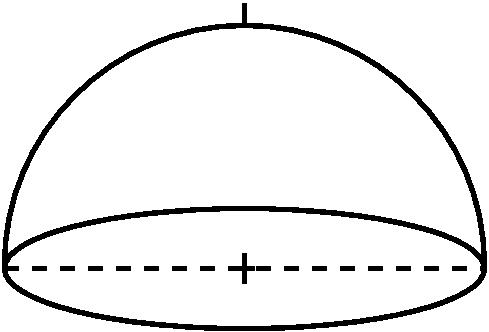Questions about the Arecibo Observatory and telescope
- When did the formal opening ceremony of the Arecibo Ionospheric Observatory take place?
- Below is a schematic diagram of the AO
telescope as viewed from above.
The 900 ton platform hangs in midair on eighteen cables, which are strung
from three reinforced concrete towers. One is 365 feet high, and the other
two are 265 feet high. The towers are named as if they were on the face of
a clock oriented with "12" to the north: T4, T8 and T12.
Which tower is the tallest of the 3?

Note: this map predates the ground screen/upgrade.
- Below is a schematic diagram of the
local sky as observed from Arecibo.
Imaging that you are standing at the center looking up. Label on this diagram the following:
- horizon
- zenith
- cardinal directions N,S,E,W
- North Celestial Pole
- Celestial Equator
- Sun's path on Feb 15, 2009

- Suppose we observe with the standard ALFALFA setup the survey
drift designated 14p2 at a Declination of +03o24'24".
What will be the zenith angle of the drift?
- Suppose we observe the drift 82p1 at a Declination of +19o49'54".
What will be the zenith angle of the drift?
- What is the minimum zenith angle at which ALFA can be positioned?
- Why can't we observe a source directly overhead?
- Below is a schematic diagram of the AO
platform as viewed from the side.

- At what azimuth will we orient the Gregorian so that we can observe the drift 82p1?
- What do we mean by an "uphill feed"?
- What are the advantages of Gregorian optics over line feeds?
- At what frequency does the very long line feed work?
- In addition to ALFA, a single beam receiver called "L-band wide" (LBW) operates
at L-band.
- What frequency range is included in the "L-band"?
- What are the other letter designations for receiver bands used at Arecibo? Give also the nominal frequency centers and ranges.
- What are the relative advantages and disadvantages of using LBW rather than ALFA?
- Which receiver is more appropriate for conducting ALFALFA follow-up observations?
- Here is a schematic diagram of the
hour-angle - declination plane as observed from Arecibo.
(Note that this one comes from the good old days, so the limit designations don't include the Gregorian or ALFA.) - Use this diagram to figure out how long a source at Declination of +03o24'24" could be tracked using an uphill feed on Carriage House #1.

- What about a source exactly on the equator?
More practice questions:
